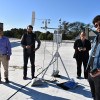From College Classes to Cancer Research: Scientist Alex Reif Tells His Story

Photo Credit: Villanova University
Alex Reif has served as a Senior Scientist for the past five of his eight years at GlaxoSmithKline — a career he began while obtaining his Master’s Degree in Chemistry from Villanova University in 2010. “I felt connected to the department, faculty and campus,” he says of his choice to continue his education after receiving his undergraduate degree from Villanova.
The Villanova College of Liberal Arts and Sciences flexible Master’s program allowed Reif to work full-time in the GlaxoSmithKline pharmaceutical lab while taking classes. Today, he works in lead optimization of small molecule drug discovery in the global healthcare organization’s cancer epigenetics unit.
“My work today is different than my research at Villanova, but I use the synthetic toolbox that I acquired at Villanova every day in the lab to design and synthesize small organic molecules,” he says.
Below, we talk to Reif about his work and continued ties with the Villanova University faculty and community.
What is the most important thing you learned during your studies at Villanova?
My studies at Villanova honed my problem-solving skills. As a scientist, it’s your job to be skeptical — you need to perform appropriate experiments to help clarify your hypothesis. On paper, a chemical reaction might look easy to execute, based on theory. Many times, however, experiments do not go as planned and the approach to problem-solving I learned at Villanova taught me to be flexible in finding solutions when unexpected challenges arise.
What are some of the most practical aspects of obtaining a Master’s Degree in Chemistry?
The skills you learn in a Master’s program are applicable to many different types of research. I chose to focus on organic chemistry, and Villanova provided strong faculty instruction and a diverse offering of specialized classes taught by practitioners in relevant industries. I learned solid fundamentals that helped build a foundation for more specialized research. I appreciated these fundamentals as I started my professional career. There was a lot to learn when I entered the pharmaceutical industry, and having a strong background in chemistry made the experience less overwhelming so I could quickly contribute to projects at work.
After graduating, you worked as a laboratory teaching assistant at Villanova. Can you talk about that experience?
Working as a laboratory teaching assistant for Villanova helped me stay connected with the campus and new classes of students. Since I also went to Villanova for my undergraduate degree, it’s great to see students in the classroom, sitting in the same seat I did and performing similar experiments.
Have you continued your relationship with professors, students and faculty at Villanova in other ways through your professional career?
Earlier this year, I represented GlaxoSmithKline at a national conference in San Francisco where I was able to connect with a professor from Villanova. We had the opportunity to catch up and he introduced me to two other Villanova graduates who were finishing their Post-doctorate fellowships and presenting their research at the conference.
We also recently had a sharing science day, and while roaming through the many posters, a new colleague pulled me aside and asked if I went to Villanova. Coincidentally, she was a few years younger than me but recognized me from a chemistry class. We connected over our time in the Villanova Chemistry department and she later provided input into a new process route design for one of our clinical candidates. Villanova has created a community that is ever present, supportive and strong.
For more information on Villanova’s Graduate Programs in the Department of Chemistry and the College of Liberal arts and Sciences, visit villanova.edu.
This is a paid partnership between Villanova University College of Liberal Arts and Sciences and Philadelphia Magazine

